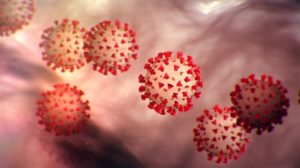COVID-19 IMPACTS: State Hospital Association: Donate masks, gloves
FDA asks Americans to donate blood; AG’s office can help with utility issues; new guidance for pot dispensaries
Published by Capitol News Illinois on March 19, 2020
By Rebecca Anzel
Statehouse Reporter

Credit: cdc.gov
SPRINGFIELD — The leader of the Illinois Health and Hospital Association asked other industries to donate masks, gloves, gowns and other personal protective equipment to the more than 200 hospitals across the state as they treat patients for the novel coronavirus disease, COVID-19.
Health care workers are “in jeopardy of potentially running out” of those supplies,” A.J. Wilhelmi, the association’s president, said in a statement Thursday.
“With continuing uncertainties about global and U.S. supplies of face masks, we urgently need to find alternative supplies, no matter where they are, so our hospitals can continue to provide life-saving care to current and future COVID-19 patients,” he said.
Wilhelmi sent a request to dentists, veterinarians, construction companies and others who might have stockpiles of such equipment, which protect nurses, doctors and other health care personnel when treating and evaluating patients.
Maintaining blood supply ‘critical’
The federal Food and Drug Administration is calling on Americans to continue “generously” donating blood during the COVID-19 pandemic.
A patient in the U.S. needs a blood transfusion every two seconds, according to the agency, and while officials support social distancing initiatives, that need does not decrease in such times.
“People who donate blood are equivalent to those people who are working in a critical infrastructure industry,” Dr. Peter Marks, the director of the FDA’s Center for Biologics Evaluation and Research, said in a statement Thursday. “…They are contributing immeasurably to the public health of our nation.”
It is safe to donate blood at a center because “they are skilled in infection control practices,” Marks added, and centers have preventative plans to handle infection spread. Those interested could schedule an appointment and receive a call when the center is ready for the donor.
According to the FDA, the following organizations can help Americans interested in donating blood find a local site:
- AABB: www.aabb.org
- America’s Blood Centers: www.americasblood.org
- American Red Cross: www.redcrossblood.org
- Armed Services Blood Program: www.militaryblood.dod.mil
- Blood Centers of America: www.bca.coop
Vets: Pets cannot get the virus
The Illinois State Veterinary Medical Association said this week that no scientific evidence suggests pets can contract COVID-19. However, veterinarians recommend pet owners maintain “proper human hygiene” when tending to their animals.
Hand sanitizers, disinfectant wipes and other cleaning methods should be employed after interacting with pets, but ISVMA Board of Directors President Dr. Olivia Rudolphi warned they cannot be used directly on or around pets.
“The best practice that any pet owner can currently follow is to take care of themselves first by following proper personal hygiene when dealing with this outbreak,” Rudolphi said. “… Limiting your pet’s exposure to individuals and other pets will help keep coronavirus — or any pathogen — from spreading from host to host, be it human or animal.”
She added owners should avoid kisses from and sharing beds with pets, especially if people in the household are showing signs of illness.
AG: Contact office about utility issues
Attorney General Kwame Raoul urged Illinoisans to contact his office about utility disconnections or disruptions.
Utility companies were mandated to delay service disconnections and waive late fees by an Illinois Commerce Commission emergency order issued Wednesday. That moratorium applies to electric gas, water and sewage services.
“It is important that Illinois residents follow guidance issued by public health authorities in order to prevent the spread of COVID-19, which may mean staying home — potentially for extended periods of time,” Raoul said in a written statement Thursday. “Being shut off from utility service is the last thing people should worry about as they work remotely, care for vulnerable populations, or self-quarantine.”
The commission’s order applies to public companies in Illinois, not to municipally-owned ones. The attorney general asked those entities to comply with the moratorium anyway.
Residents who experience issues may contact Raoul’s office at his website: https://ccformsubmission.ilattorneygeneral.net.
Marijuana guidance
Illinois officials issued guidance Tuesday allowing medical marijuana dispensaries to sell products on the curb or in parking lots adjacent to their stores. Recreational product sales must still be made in a “limited access area.”
The Department of Financial and Professional Regulation also instructed staff to keep customers at least six feet from one another, and mandated facilities to regularly clean surfaces most touched by customers, including door handles and ordering screens.
“Our top priority is to minimize the risk of and protect as many people from exposure to COVID-19,” Toi Hutchinson, Gov. J.B. Pritzker’s senior advisor for cannabis control, said in a statement. “These steps prioritize that critical objective, while also ensuring medical patients have access to the medicine they need.”
A provision in the statute legalizing adult-use recreational marijuana requires dispensaries keep enough product for medical patients at all times, at least eight facilities opted not to continue selling to recreational customers, a spokesperson said.
IDFPR inspectors “will continue to monitor cameras inside dispensaries daily to ensure continued compliance” with the department’s rules, according to a news release. “IDFPR expects dispensaries to answer inspectors’ calls or call them back promptly,” it added.
Cannabis Business Association of Illinois Executive Director Pamela Althoff said the guidance was issued after collaboration between the industry and Pritzker’s administration.
